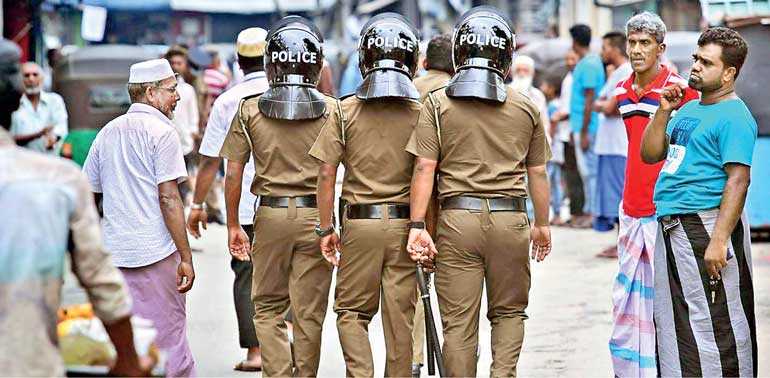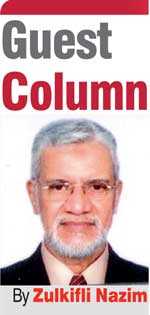Thursday Feb 19, 2026
Thursday Feb 19, 2026
Saturday, 11 May 2019 00:11 - - {{hitsCtrl.values.hits}}

 “Culture of fear (or climate of fear) is the concept that people may incite fear in the general public to achieve political or workplace goals through emotional bias.” (American sociologist Barry Glassner)
“Culture of fear (or climate of fear) is the concept that people may incite fear in the general public to achieve political or workplace goals through emotional bias.” (American sociologist Barry Glassner)
Fear is in the air, and fear is surging. Sri Lankans are more afraid today than they have been in a long time. A majority of Sri Lankans, whatever their ethnicity may be, are worried about being victims of terrorism and crime, numbers that have surged over the past couple of years to highs not seen for more than a decade.
Every week seems to bring a new large or small-scale terrorist attack. Mass attacks form a constant drumbeat and a sense of disorder is constant.
This is what has been engineered by those whose lust for power and their confederates: Intense, insatiable desire to attain power and control, is unquenchable accompanied by mass destruction of life and property for personal gains.
They paint a fearful picture – instilling pseudo-fear and panic among every household in order that they may not send their children to school.
Shoppers are reluctant to enter markets, supermarkets, and shopping centres because psychologically they have been brainwashed – they fear crime and terror; they are also disproportionately warned to be wary of foreign influence – causing further anxiety.
Even during the 30-year war in spite of the heartrending Kokilai-Nayaru attacks, the Central Bank, Pettah bomb blasts, attacks on the Dalada Maligawa and Mahabodi by the LTTE together with the Kattankudy Mosque massacre, including the massacre of women and children in both Kattankudy and Eravur, orchestrated by Karuna Amman – Vinayagamurthi Muralitharan, who was appointed to the post of Sri Lanka Deputy Minister by the Rajapaksa Government, and a host of other terrorist attacks involving the deliberate use of violence against civilians – the then Government did not instil fear; but on the contrary, inspired confidence in our security system and hence people went about with their normal activities.
Today insult upon insult is rained on the security services by those craving to get back into the driving seat when our current security and intelligent services have been doing a wonderful, superb and an excellent job in containing and controlling this organised terror, at the risk of their lives. And we the people of Sri Lanka are indeed thankful and grateful for their altruistic and unselfish concern for the welfare of others.
We wholeheartedly salute them.
So, instead of lavishly showering accolades, the power-hungry, clumsy politicians are strutting about ruffling their borrowed feathers and falsely accusing our own security forces of incompetency.
An investigation and analysis of all these brings us to the conclusion that we are being cornered into a fear-based leadership – using fear to gain power. And using this fear and panic to have a negative economic effect globally.
Leading the masses by fear puts them in a constant state of anxiety and this fear-based leadership can often have origins traced back to a leader’s own lack of self-confidence.
When these people seek out public office this becomes a problem, because those who use power to assuage their own fear, also use fear against others to bolster and maintain their power, which certainly will have a negative, destructive effect.
The incumbent Government was doing very well on the side of the economy: the Government initiated the theme ‘Enterprise Sri Lanka’. Under this theme, Government had planned its production economy in order to achieve the Government’s medium-term targets such as per capita income of $ 5,000, one million new jobs, doubling exports, more than 5% continuous GDP growth etc. It also launched ‘Gamperaliya’ – the rapid rural development project for the welfare of all concerned.
It is also pertinent to quote that almost 10 years after the end of its civil war, Sri Lanka was named the best country in the world to visit in 2019 by the internationally renowned Lonely Planet publisher of a large travel guide book.
However, envious, covetous, greedy, acquisitive, avaricious power crazed, deranged politicians plotted to destroy the good name of Sri Lanka by hitting at the core of our economy – our tourist trade.
Some of those in power and those vying for power, consciously or unconsciously created fear in others by orchestrating and supporting terrorist organisations. At inception they did it by acts of sarcasm, shaming, bullying, physical intimidation, and culminating in perpetrating actual ethnic violence.
So we now have a budding totalitarian regime that keeps everyone in fear and working to avoid doing anything that would put oneself at risk. The people now fear that they could be taken into custody arbitrarily. Arrests of citizens can be unpredictable and capricious, and enough to encourage everyone to keep their heads down, their mouths shut, and willing to engage in or overlook otherwise inhumane or delusional behaviour. This is what Hitlers of the world are hoping for.
Generally speaking, times of social unrest have always been the feeding ground for power-hungry megalomaniacs. Periods of economic depression, political or social chaos give tyrants the opportunity to appear as saviours and, when conditions allow it, seize power by coup d’état or other means. Their populist demagoguery can seduce broad swathes of the population.
They are extremely talented at inflaming the ‘wish to believe’. Their cries of patriotism and righteousness are just what the populace wants to hear. As expert manipulators, despotic dictators take advantage of this universal cognitive shortcut.
These are the dictators who are also especially good at targeting socially and economically vulnerable people – those who are not always very well educated or informed and, as such, often feel confused and insecure. Dictators exploit the rage and frustration of this population through the psychological process of ‘identification with the aggressor’. Many of the disempowered see in the ‘strong’ man or woman both a reflection of themselves and the promise of a victory over their downtrodden state.
They are caught in the allure of illusions and magical thinking. They become brainwashed. Whatever the societal wrong, dictators are adept at inciting blame and scapegoating.Those dictators who lust for power quickly learn the value of indoctrination. To maintain their hold on power, they seek to control information, ideally by centralising all mainstream media. Positive news is attributed to them and negative news is ascribed to enemies of the state. With the help of the propaganda machine, dictators become an integral part of everyone’s life. They manipulate the final outcome of elections, by curtailing press freedom, limiting the opposition’s ability to campaign and spreading misinformation – ‘fake news’.
Many past and contemporary dictators suffer from extraordinarily high levels of narcissism, psychopathy and paranoia. They have an inflated sense of self-importance and feel entitled to the admiration of others. An inherent lack of empathy, guilt or remorse allows the most malignant to commit unspeakable atrocities.
But while it is easy to vilify dictators, we should also realise that, in many ways, we (the people) are the ones enabling them. After all, a dictator cannot function without followers. Although we may not admit it out loud, it’s attractive to have others tell us what’s right and what’s wrong. But abdicating personal responsibility cripples freedom of expression and derails democratic processes. The good news is, however, that although we enable dictators, we can also disable them.Concluding with guidance in this month of Vesak from Lord Buddha: “Being a ruler requires clear understanding: study the past and present, know when to be active and passive, temper force with mercy, be kind to one’s subordinates, benefit the people, and give equally.”
“Change is never painful, only the resistance to change is painful.”